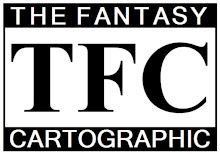As if we weren’t working on enough different projects, I wanted to write a little bit about yet another one. In addition to my love of maps, I really enjoy languages—mostly fictional ones. When it comes to fantasy languages, obviously Tolkein in the king, but there is a long tradition of “made-up” languages appearing in literature, whether in fantasy or science fiction or even more mainstream genres. Most of us who have played rpgs for any length of time have at least dabbled in language creation.
Activities as simple as creating names for our characters (as a player) or creating place names (as a DM) are what I would consider the first steps in language creation. Many people have gone much further than that, and there are whole online communities devoted solely to the topic of created languages—one prominent example is here.
What I find amazing is that there has not been (to my knowledge) any materials published specifically for the DM/player for use with rpgs, either presenting fantasy languages or assisting players (in which I include DMs) in devising their own. In light of that, we are working on a project that we are calling the Fantasy Language Project. While we are not sure of the full scope of the FLP, at the least it means that I will be posting here on the blog reports of the work that we have done—a record of how we develop the languages that we will work on. We will point to the resources that we have used and give you a glimpse of the process from beginning to end.
Perhaps, if we find that there is enough interest and that the FLP assumes a life of its own, we will start an electronic newsletter and move all content that we create onto that format. In that way, Carto Cacography can maintain its identity as a blog devoted to rpg mapping (amongst other things). In the longer term, one idea that we have had is to develop one or more languages and then publish dictionaries for them, including grammar, vocabulary, etc and compiling all of the design notes into one easy-to-read format. Even further, we could provide a license along with those dictionaries allowing the commercial use of the languages in any published works.
While it might prove unfeasible, the idea of seeing an elvish or dwarven language, even if only in snippets or a few passages here or there, that is consistent across products from many different publishers is appealing to me.
Starting today and continuing onward, there will be a ‘Tuesday Talkie’ post each week that details the efforts of the FLP. It will include a status report and any other updates that I deem appropriate.
Subscribe to:
Post Comments (Atom)








It's so difficult for educators to get students to be multi-lingual. I always wondered why they didn't offer Elvish or Klingon to middle schoolers to generate interest and familiarity with language.
ReplyDeleteI also wondered why they left computer programming education in the hands of mathematicians instead of linguists...